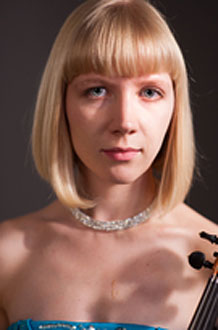|
Symphony
SRS SEASON ENDS WITH RESOUNDING TA-TA-TA-BANG
by Terry McNeill
Sunday, June 1, 2025
Symphony
YOUTHFUL VIRTUOSITY ON DISPLAY AT USO'S MAY CONCERTS
by Peter Lert
Saturday, May 17, 2025
Symphony
MYSTICAL PLANETS AND LIVELY GERSHWIN ORTIZ AT FINAL SRS CONCERT
by Peter Lert
Sunday, May 4, 2025
Symphony
VSO'S CONCERT MUSIC OF TIME, MUSIC OF PLACE
by Peter Lert
Sunday, April 27, 2025
Choral and Vocal
VOCAL ELEGANCE AND FIRE AT THE 222'S RECITAL APRIL 26
by Pamela Hicks Gailey
Saturday, April 26, 2025
CANTIAMO SONOMA SINGS AN INSPIRED GOOD FRIDAY MOZART REQUIEM CONCERT
by Pamela Hicks Gailey
Friday, April 18, 2025
DRAMATIC SHOSTAKOVICH SYMPHONY CLOSES PHILHARMONIC'S 25TH SEASON
by Terry McNeill
Sunday, April 13, 2025
LARGE COLLEGE OF MARIN AUDIENCE GREETS STOPHER ARTISTRY
by Terry McNeill
Saturday, April 5, 2025
Chamber
FRISSON DELIVERS SHIVERS OF DELIGHT
by Abby Wasserman
Sunday, March 30, 2025
OLD AND MOSTLY NEW IN SRS MARCH CONCERT IN WEILL
by Peter Lert
Saturday, March 22, 2025
|
 |
 Violinist Julia Glenn |
PIANOSONOMA SERIES OPENS WITH ECHT GERMAN ROMANTICISM
by Terry McNeill
Tuesday, July 26, 2016
PianoSonoma’s second season in SSU’s Schroeder Hall began July 26 with a mixed program under the series appellation “Vino & Vibrato.” The set of student workshops and concerts, headed by Juilliard School pianists Jessica and Michael Shinn, puts artists in residence in close contact with Sonoma County adult musicians for two weeks each summer.
Titled a “Love Triangle” (Clara and Robert Schumann with Brahms), Clara Schumann’s Three Romances for Violin and Piano, Op. 22, had a shaky opening. Violinist Julia Glenn’s intonation wavered and the thematic projection in the soaring melancholy of the Andante was tentative. Clear note taking in the Allegretto was seldom clear, but her best playing came in the final Agitato’s light lyricism, and Ms. Glenn leaned gracefully into some notes with palpable effect.
An 11-minute interlude work from Brahms, his piano transcription for four hands from Robert Schumann’s E-Flat Major Quartet, Op. 47, (Andante only) was played by the Shinns. Ms. Shin was segundo and the arching phrases, lovely counterpoint and poignant sadness of the super-romantic music was vivid and chaste. Mr. Shinn noted to the audience that the work was Brahms’ best love song for Clara, but that gift could also be the Andante from the Op. 60 C Minor Piano Quartet.
Pianist Mika Sasaki played well with forceful rolling chords in the final Romance, and continued admirable pianism with two sets of variations on a Robert Schumann theme from his Op. 99 Bunte Blätter. First came Clara’s Op. 20, and Ms. Sasaki’s tempos were never rushed and she played with a subtle touch, though over pedaling at times made the left-hand line muddy. The slower variations and the concluding arpeggios were lovely.
Brahms’ Op 9 Variations on the same theme is far removed from the composer’s virtuosic Handel Variations, and Ms. Sasaki played 12 of the written 16. Few other composers (Bizet, Rubinstein) at this time were writing formal variations for piano, and the pianist made a good case for the 1854 work with ruminating themes, a boisterous repeated-note variation and a catchy dance variation. The music had a far off feel with the pianist playing strong bass chords before in the last variation slowing down the tempo to elegant effect.
Following intermission mezzo-soprano Kara Sainz joined pianist Peter Dugan in three sets of songs: three from Brahms and two each by Clara and Robert. Clara’s Liebst du um Schonheit and Liebeszauber were performed well but the better known Brahms and Robert Schumann works overshadowed them. The big “Wie Melodien” (Op. 105, No. 1) was verbally introduced by Mr. Duggan, and his clean distinctive piano sound melded well with Ms. Sainz’s supple voice and excellent German diction.
Ms. Sainz’ slow steady voice sounded comely in the well-known “Die Mainacht” (Op. 43, No. 2), but lacked the last bit of warmth in the biggest climaxes of “Meine Leibe ist grun” (My love is Green), Op. 65, No. 5.
The concert’s last offering, the Robert Schumann songs, was a fitting end. Ms. Sainz flattened (presumably by artistic design) some notes in phrases in “Er, der Herrlichste von allen,” from the cycle Frauenliebe und Leben, a seminal work for mezzo. Here Mr. Dugan’s playing at places covered the singer, but was in perfect balance for the operatic “Widmung” from the cycle Myrthen, Op. 25. Some of the raw vocal power and color needed in this song was absent, but perhaps Liszt’s two piano transcriptions of “Widmung” are too much in mind, and defer the beauty of this celebrated song from a salutary mezzo.
Most of the 80 people in the hall rose in a short ovation.
|
